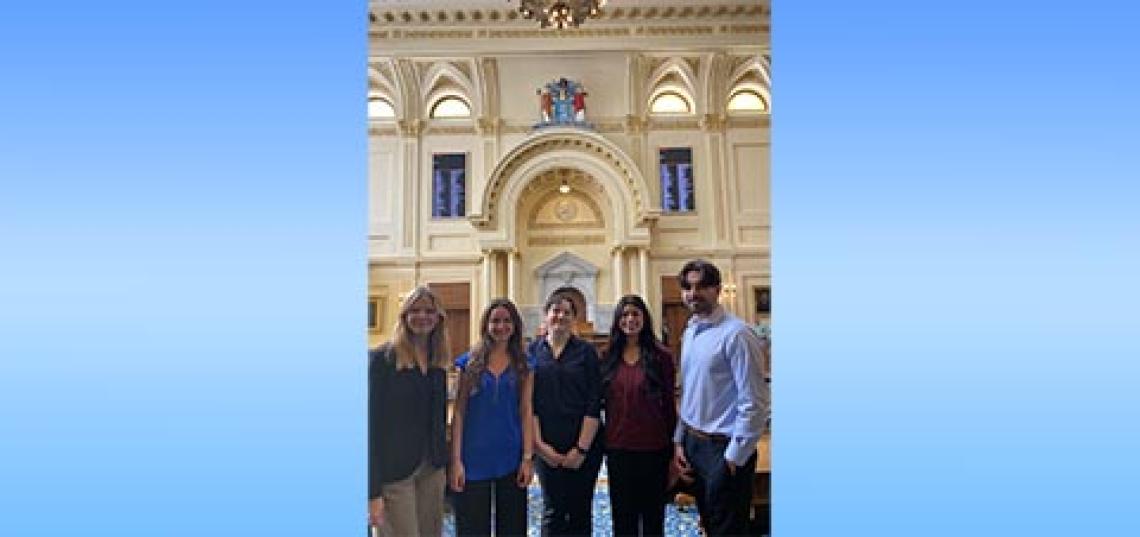
The New Jersey Civic Information Consortium has awarded the New Jersey State House News Service a $100,000 grant, a portion of $370,000 in grant funding the Consortium will provide to five news projects in New Jersey.
This grant funding, according to a Consortium press release, “will enhance local journalism, civic engagement, and access to vital information in communities throughout New Jersey . . . and empower local organizations to address critical gaps in news coverage and provide residents with the information they need to actively participate in civic life.”
The grant for the NJ State House News Service, founded in June 2023 by SC&I Journalism and Media StudiesLecturer Deb Howlett, will fund the costs of a managing editor, a new learning lab, and enable the service to support 8-10 interns instead of five, Howlett said.
Students from Rutgers University, Rowan University, The College of New Jersey, other programs are eligible to apply for NJ State House News Service internships. During the spring 2024 semester, the two interns were Allyssa Bovasso-Pignataro, who graduated from SC&I in 2024 with a bachelor’s degree in Journalism and Media Studies with a specialization in Global media, and a minor in Digital Communication and Information Media (DCIM), and Rebecca Nieves, from The College of New Jersey.
Howlett, a former USA Today reporter and Midwest bureau chief, spoke with SC&I about the many ways NJ college students, media outlets, and residents benefit from the news service, the role of journalism in a democracy, and more.
How does the NJ State House News Service serve the journalism needs in the state?
DH: Not so long ago, nearly 70 reporters covered the State House in Trenton on a regular basis. That number is now closer to twenty, and many of those serve major news corporations. Smaller, independent news organizations just don’t have the capacity any longer to provide coverage of the state Legislature to their audiences. It has created a void in the news ecosystem. This program is an attempt to fill that void by adding more reporters. But, more than that, we need a way to bring young, bright journalists into the pipeline and provide the opportunity to learn how to write about government and politics. That training is the primary mission of the State House News Service. Part of fulfilling that mission is getting the student work published, which is where our media partners enter the picture. Our model is to offer the content our student journalists produce without cost to news organizations.
How does interning with the NJ State House News Service enhance or reinforce the knowledge students gain in SC&I classrooms as Journalism and Media Studies majors?
DH: In the classroom, students learn the theories and ideas behind the practices of reporting. That is valuable and foundational knowledge. They may even write stories for classes that closely approximate what they will encounter outside of academia. We hope the News Service presents an opportunity for students to take that classroom knowledge and apply it the real world. I would liken it to a teaching hospital, where medical students treat real patients. During a News Service internship, student journalists do the same work their professional colleagues do — interviewing the governor, reporting from the floor of the General Assembly, working state legislators for information about legislation and policy priorities. It puts them in the real world, with guidance, support, and mentoring from professional journalists in a real newsroom environment to produce copy for real news organizations statewide in a way that is hard to replicate in the classroom.
Does Rutgers SC&I support the NJ State House News Service? If so, how?
DH: Early on, I spoke with both Amy Jordan and Steve Miller who were enthusiastic, encouraging, and supportive, especially in terms of evangelizing the work we do and alerting students to the opportunities we offered. In fact, Steve was maybe the second or third person I spoke to when I was first trying to figure out if this program would be possible. Rutgers was a great source of encouragement and support in the potential to realize the vision and this probably wouldn’t have happened otherwise.
Given your extremely successful career as a domestic and international reporter and bureau chief, what do you strive to teach Rutgers JMS students and state house interns?
DH: Well, I’m never one to shy away from waxing poetic about my experiences as a journalist. But the thing I most want to bring to student journalists through this program is the passion that drew me to journalism in the first place: holding public officials to account by reporting on what they are doing and why. That watchdog role is the bedrock of our democracy and it’s more important now than ever. I want more than anything for our interns to come away from the program inspired to hold government leaders and policymakers accountable, as well as having the skills and experience to produce stories that inform and empower the public.
Learn more about the Journalism and Media Studies major at the Rutgers School of Communication and Information on the website.
Photo: Fall 2024 interns include Rutgers SC&I JMS major Umehani Rehmanji, Rowan students Gary Love and Lila Swietanski, and TCNJ students Jenna Rittman and Skye Frawley. Pictured left to right are Skye, Lila, Jenna, Umehani, and Gary. Courtesy of Deb Howlett
